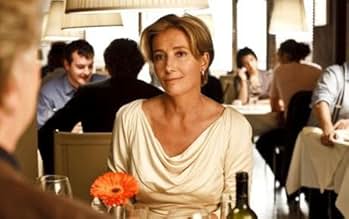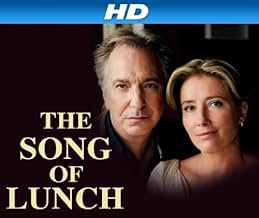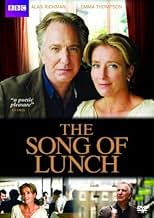The Song of Lunch
- TV Movie
- 2010
- 50m
IMDb RATING
7.3/10
2.7K
YOUR RATING
A London publisher recounts a lunchtime reunion with a former lover, in poetic monologue.A London publisher recounts a lunchtime reunion with a former lover, in poetic monologue.A London publisher recounts a lunchtime reunion with a former lover, in poetic monologue.
- Director
- Writers
- Stars
- Nominated for 1 Primetime Emmy
- 4 nominations total
- Director
- Writers
- All cast & crew
- Production, box office & more at IMDbPro
Featured reviews
Combining the art of filmmaking and the art of poetry is extremely difficult, very complex undertaking for any director. It is much easier and with more opportunities to just film from a screenplay, where dialogue can flow with no absolute firm structure, do an actor can or director can change a word or two or more. No one can improvise working with a poem. Song of Lunch works like a fine waltz. Christopher Reid's poem is brilliant, as are Alan Rickman and Emma Thompson who dance his stanzas, as we hear them narrated by Rickman. The pacing of this film is so well done that we are are pulled in immediately and stay in pace up until the ending.
Christopher Reed's poem 'The Song of Lunch' is brought brilliantly to life here by Alan Rickman and Emma Thompson, two fine actors and, though like most actors they sometimes waste time (and make money, no doubt) in rubbish, here we see them both at the top of their games. Rickman has the harder role, since he also has to narrate the verse; but Thompson handles herself excellently opposite him, never attempting to claim a larger space than is available but filling what is there perfectly. The story is a classic male tragedy, of a drunken middle-aged man whose awareness of his own increasing unattractiveness is a self-fulfilling prophesy; but the observation and psychology are razor sharp, and the words clear and cutting. It could be thought a bold move to dramatise a poem; but with this level of quality at all levels, perhaps the success of this project was never really in doubt.
Alan Rickman plays a jaded publisher meeting a past flame (Emma Thompson) at an old haunt, now impersonally renovated. The publisher has a one-track mind and views her every move as erotic.
This is a dramatised narrative poem. I'm sceptical about modern poetry but this one's quite good. It may be familiar ground but a lot of the phrases are actually quite good: consciously poetic but a concise description. Fans of Alan Rickman might find it hard to control himself as his character is aroused by everything: a squeezed hand, a glass of wine meeting his lips, a comely waitress, even a pepper shaker. The story is told through his perspective, much of it as voice-over. The switch between voice-over and dialogue really works, creating tension and drama in what is a fairly undramatic scene. It's like a short play.
Both Rickman and Thompson speak the blank verse (with the occasional rhyme) very naturally. Their characters are intellectual people and the talk comes naturally to them, particularly Rickman's emotionally/creatively/sexually frustrated character.
It's only 50 minutes so it's worth a watch. It would have been nice if it were part of a series of poems.
This is a dramatised narrative poem. I'm sceptical about modern poetry but this one's quite good. It may be familiar ground but a lot of the phrases are actually quite good: consciously poetic but a concise description. Fans of Alan Rickman might find it hard to control himself as his character is aroused by everything: a squeezed hand, a glass of wine meeting his lips, a comely waitress, even a pepper shaker. The story is told through his perspective, much of it as voice-over. The switch between voice-over and dialogue really works, creating tension and drama in what is a fairly undramatic scene. It's like a short play.
Both Rickman and Thompson speak the blank verse (with the occasional rhyme) very naturally. Their characters are intellectual people and the talk comes naturally to them, particularly Rickman's emotionally/creatively/sexually frustrated character.
It's only 50 minutes so it's worth a watch. It would have been nice if it were part of a series of poems.
He came close to his fantasy, a renewal. But shortly let his mind take him down a trail of various sorts of negativity. He was on that line a bit, a line where he could have been witty and upbeat and challenging, a line he crossed into torpor and, well, annoyance, and more.
Or perhaps He knew something the other reviewers here (and they are a very solid group of reviewers) did not know: That She too wanted a renewal. Though her words bely that possibility, well into the film, she touches his hand in a way that is personal and perhaps a bit erotic. Perhaps in her wonderful life with a successful author and two nondescript kids, she would like to recoup her past with He.
Perhaps He knew this, and sabotaged it. If so, Why?
The subject that screenwriters love to chat about, subtext, comes up. I thought the Mamet fiasco, PHIL SPECTOR, had the characters all delivering subtext as dialogue. Thus there was no mystery. Here, however, the subtext was given us in his unspoken words, his thoughts, as voice-over dialogue in his own head. Perambulating in his skull. It worked.
For Rickman, I find this his second most compelling work, the first being CLOSET LAND (which I saw on a Saturday night in a popular movie theater, but only me in the room for that film). Both works exploit his rich voice.
Or perhaps He knew something the other reviewers here (and they are a very solid group of reviewers) did not know: That She too wanted a renewal. Though her words bely that possibility, well into the film, she touches his hand in a way that is personal and perhaps a bit erotic. Perhaps in her wonderful life with a successful author and two nondescript kids, she would like to recoup her past with He.
Perhaps He knew this, and sabotaged it. If so, Why?
The subject that screenwriters love to chat about, subtext, comes up. I thought the Mamet fiasco, PHIL SPECTOR, had the characters all delivering subtext as dialogue. Thus there was no mystery. Here, however, the subtext was given us in his unspoken words, his thoughts, as voice-over dialogue in his own head. Perambulating in his skull. It worked.
For Rickman, I find this his second most compelling work, the first being CLOSET LAND (which I saw on a Saturday night in a popular movie theater, but only me in the room for that film). Both works exploit his rich voice.
I sat down to watch this for a second time in years and was immediately pulled in again by the clever vitriol of the male character with his witty and brutally honest musings. He is wasted potential personified, recognizing many of his own failings - right up to the point of changing anything, which he refuses to do. It's just easier to curl up around a bitter glass of restaurant chianti and bleat on about how all change is for the worse.
Joining him at the restaurant, the woman breezes into the picture, all lightness and controlled gladness - the picture of elegance and change personified. She is genuinely happy to see him and ready to scoop him into a reminiscence of nostalgic affection but he won't let go of his anger at her leaving him. He refuses to truly see himself and twists their reunion into an internal pity party that manifests in leers and snide comments. And still, he is somehow a sympathetic character (oh thank you, Alan Rickman). You understand her affectionate regard, but also her healthy detachment.
The poem is fascinating and the screenplay adaptation is practically perfect in every way. The beautiful photography and luscious sound editing propels this poem into an incarnate, omnisensory, and very human experience.
Joining him at the restaurant, the woman breezes into the picture, all lightness and controlled gladness - the picture of elegance and change personified. She is genuinely happy to see him and ready to scoop him into a reminiscence of nostalgic affection but he won't let go of his anger at her leaving him. He refuses to truly see himself and twists their reunion into an internal pity party that manifests in leers and snide comments. And still, he is somehow a sympathetic character (oh thank you, Alan Rickman). You understand her affectionate regard, but also her healthy detachment.
The poem is fascinating and the screenplay adaptation is practically perfect in every way. The beautiful photography and luscious sound editing propels this poem into an incarnate, omnisensory, and very human experience.
Did you know
- TriviaThe photo on the dust jacket of the lead female character's husband's book is one of Greg Wise, Dame Emma Thompson's real-life husband.
- ConnectionsFeatured in The Wright Stuff: Episode #14.45 (2010)
Details
Contribute to this page
Suggest an edit or add missing content





























